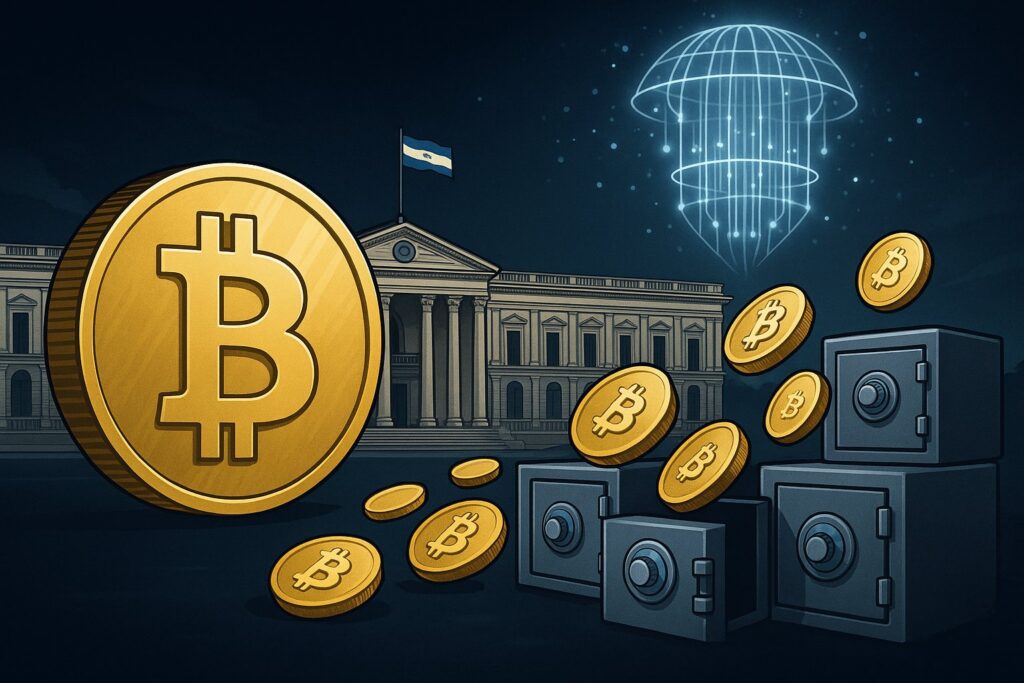The world of cryptocurrencies is constantly evolving, with innovative solutions and strategic maneuvers by nation-states shaping its landscape. Among these, El Salvador has emerged as a pioneering figure, making historical decisions that have reverberated across the global financial community. By adopting Bitcoin as a legal tender in 2021, the country embarked on a bold economic experiment. This forward-thinking approach continues to evolve as El Salvador implements strategies to safeguard its digital assets amidst theoretical threats posed by advancements in technology.
El Salvador’s Pioneering Bitcoin Strategy: Security Measures in an Evolving Digital World
El Salvador as a Bitcoin Innovator
In 2021, El Salvador became the first nation to adopt Bitcoin as legal tender alongside the US Dollar, setting a historic precedent under the leadership of President Nayib Bukele. This groundbreaking decision was implemented through legislation that elevated Bitcoin to the same status as the country’s primary currency. This move attracted global attention and sparked debates on the future of digital currencies in national economies. Despite initial enthusiasm, challenges have emerged, including economic difficulties and public sentiment against Bitcoin as the national currency, leading to some policy reconsiderations.
The Role of the Bitcoin Office
El Salvador’s commitment to transparency in cryptocurrency management is exemplified by its government-run Bitcoin Office, which regularly publishes information on its reserves. This openness distinguishes El Salvador from many nations, providing citizens and analysts with detailed insights into the country’s cryptocurrency holdings and their evolving strategies. Recently, El Salvador has begun distributing its Bitcoin reserves across multiple new addresses to strengthen the security of its national reserves against potential threats, aligning with best practices in cryptocurrency management.
New Security Strategy
The Bitcoin Office has announced a strategic shift in its approach to managing Bitcoin reserves by decentralizing storage across multiple addresses. This decision involves transferring the country’s 6,285 Bitcoins across several unused addresses, with no more than 500 Bitcoins stored per address. This diversification aims to mitigate risks associated with concentrated holdings by reducing the potential impact of cybersecurity threats.
Quantum Computing and Bitcoin Security
The impetus for this security enhancement is the theoretical risk posed by quantum computing advancements. Quantum computers, with their potential to disrupt current encryption standards via Shor’s Algorithm, could threaten Bitcoin’s security if they achieve sufficient computational power. Although experts agree that present-day quantum computers lack the capability to compromise Bitcoin, El Salvador is proactively addressing these long-term threats by diversifying its reserve storage.
Expert Opinions on Quantum Threats
Industry analysts recognize El Salvador’s precautionary approach as prudent, though they caution that quantum computers are not yet capable of attacking Bitcoin effectively. Current quantum systems are limited by their low qubit counts and operational instability. Critics argue that Bitcoin remains secure for now, with most holdings residing in addresses that have undisclosed public keys, which are expected to withstand future advances in quantum computing.
Maintaining Transparency
Despite its new security-focused strategy, El Salvador remains committed to transparency by providing public access to its updated Bitcoin reserve management via an online dashboard. This approach ensures ongoing public insight into national cryptocurrency reserves, reinforcing trust and openness in its cryptocurrency dealings.
Conclusion and Outlook
El Salvador’s strategic posture underscores the prioritization of security even as potential threats seem distant. By taking proactive measures, the country aims to safeguard its cryptocurrency investments and strengthen confidence in its Bitcoin policies. Whether other nations will follow suit remains to be seen, but El Salvador’s actions have invigorated global discourse on cryptocurrencies and their intersection with emerging technologies like quantum computing. Bitcoin’s prominence in El Salvador continues to evolve, paralleling broader trends in digital finance.
The Emergence of Bitcoin Hyper
Bitcoin Hyper introduces a new era for Bitcoin by offering the first genuine Layer-2 solution that enhances transaction speed, reduces costs, and supports modern smart contracts. While Bitcoin itself is secure, Bitcoin Hyper leverages the Solana Virtual Machine and a decentralized bridge to bring high-performance applications to the Bitcoin ecosystem, including DeFi and dApps, backed by Bitcoin’s robust blockchain.
The $HYPER Token: Unlocking New Opportunities
During its presale, the $HYPER token is available at the lowest price, offering an equitable entry without insider advantages. The token facilitates transactions and smart contracts, can be staked for significant rewards, and provides access to exclusive features on the platform. With transparent distribution and a growth-oriented focus, $HYPER presents an opportunity to participate in the next major evolution of Bitcoin technology.
How does El Salvador’s Bitcoin strategy impact its economy?
El Salvador’s adoption of Bitcoin has positioned it as a leader in cryptocurrency innovation, but it also introduces economic volatility. The strategy aims to boost financial inclusion and innovation, although challenges such as currency fluctuations and public skepticism remain significant hurdles.
What is the future potential of quantum computing for cryptocurrencies?
Quantum computing holds the potential to revolutionize encryption and processing speeds in the future. However, its current technological capabilities fall short of impacting cryptocurrencies directly. Experts predict that it may take years before quantum computers pose a real threat to blockchain security.
Why is Bitcoin Hyper important for the crypto community?
Bitcoin Hyper represents a significant advancement by integrating fast transactions, low fees, and smart contract capabilities into the Bitcoin network. It aims to address scalability issues and expand the use cases for Bitcoin, making it more versatile and appealing to a broader range of users and developers.

